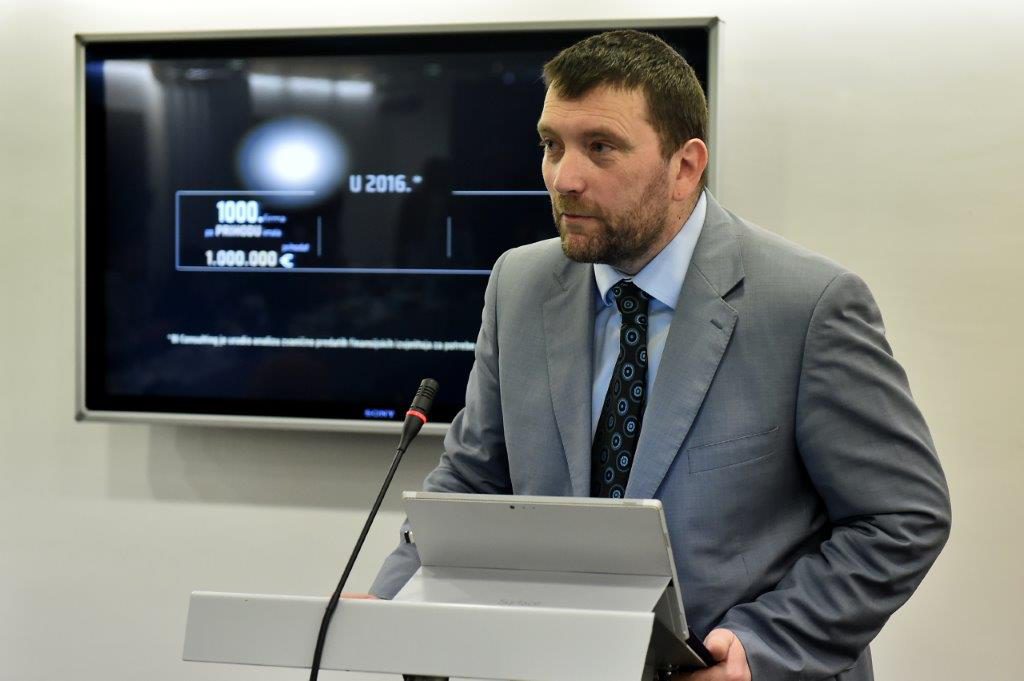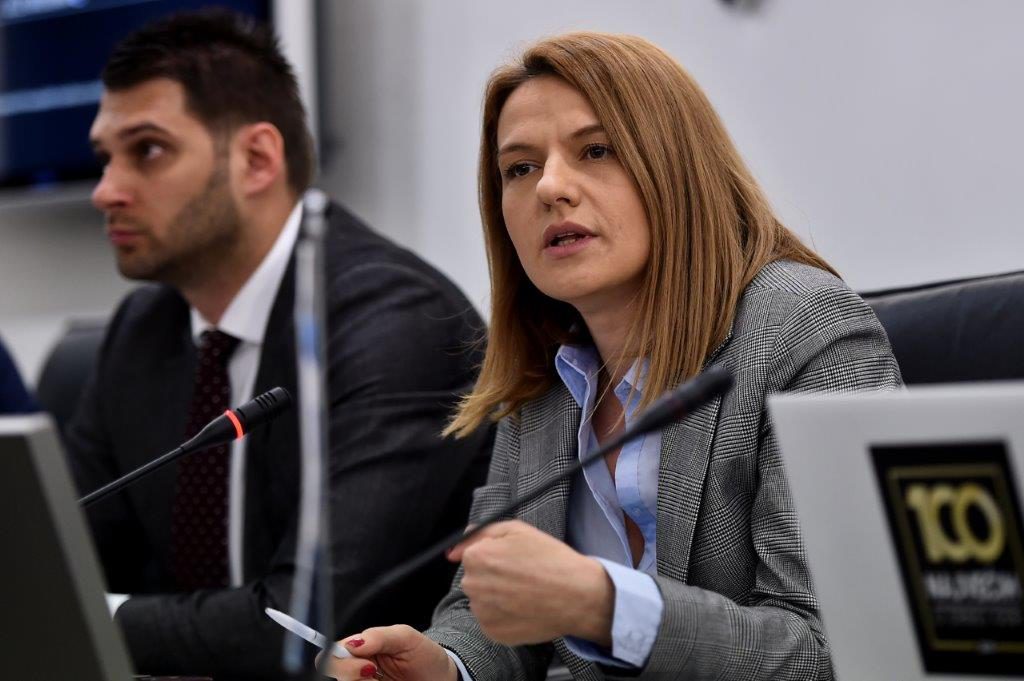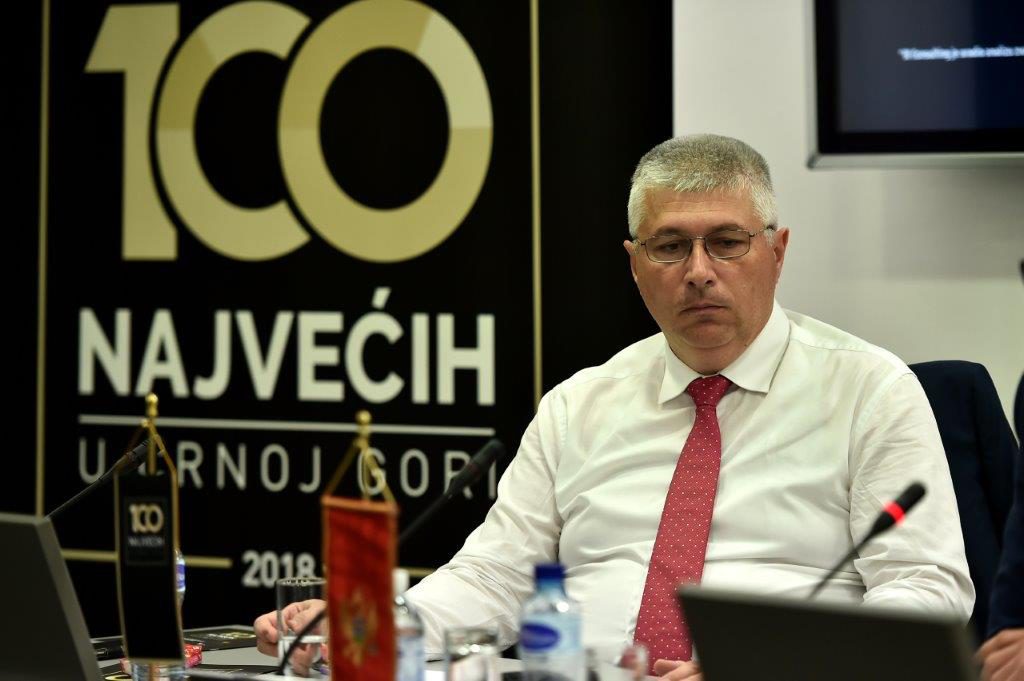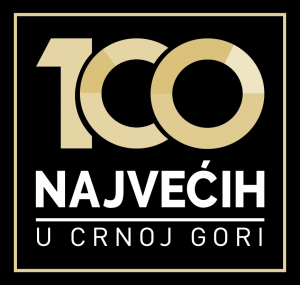On Thursday, April 12th, the “Top 100 in Montenegro” project organised the panel discussion “How to encourage local products and services and avoid violation of assumed international obligations” at the Montenegrin Chamber of Economy. The panel started at 11am.
The panellists included Mr Nemanja Katnić, state secretary at the Ministry of Finance of Montenegro, Mr Radosav Baćko Babić, M.E., director general of the Directorate for Investments, Development of Small and Medium-sized Enterprises and Management of EU Funds at the Ministry of Economy, Ms Nina Drakić, head of the Research and Analysis Department of the Montenegrin Chamber of Economy, and Mr Milutin Đuranović, M.E., co-owner of the “Lazine” dairy. The panel was hosted by Mr Ratko Nikolić, founder of BI Consulting, the leading provider of credit rating information.
The panel participants discussed competitiveness of local companies and their positioning in relation to regional and global corporations, support measures and incentives for the economy, plans in that field, actions organised by national business associations, as well as experience of local producers and their views of the market.
Mr Radosav Baćko Babić, M.E., director general of the Directorate for Investments, Development of Small and Medium-sized Enterprises and Management of EU Funds at the Ministry of Economy, reminded other attendees that this Government department established the Directorate for Investments, Development of Small and Medium-sized Enterprises and Management of EU Funds in order to improve coordination of activities and enhance support to micro, small and medium-sized enterprises.
“The so-called one-stop-shop system has been established, allowing companies to obtain information related to investments, current business operations or starting a business. This year, the Ministry of Economy will implement 10 business support programmes, which should contribute to the modernisation of production and service capacities, introduction of international business operation standards, application of innovative business solutions, and clustering. This will have impact on improvement of internal performances of companies and overall strengthening of competitiveness of the Montenegrin economy,” he said.
Babić is convinced that companies selected into top 100 in Montenegro in all categories will be beneficiaries of the support programme in the forthcoming period and serve as successful examples to others “because they are socially responsible, they pay their taxes and contributions regularly, they employ new people and they invest in our better economic future.”

Radosav Baćko Babić
Mr Nemanja Katnić, M.E., state secretary at the Ministry of Finance of Montenegro, has said that his department has been actively implementing the fiscal policy that, through certain incentives, should contribute to intensification of economic growth as well as to creation of reform activities to attract foreign direct investments. This is, among other things, confirmed by the progress in the Doing Business 2018 report in which Montenegro was ranked 42ndout of 190 countries and thus, compared to the last year’s revised report, improved its ranking for 9 places.
He has also reminded other attendees that, within the Global Competitiveness Index 2017/2018 of the World Economic Forum, Montenegro has been ranked 77th out of 137 countries, which is a progress of 5 places compared to the last year’s report.
“What we cannot neglect when discussing Montenegro’s advantages from the point of view of an investor is the fact that it is a relatively new, open market with numerous positive characteristics, such as euro as official currency, competitive tax system, qualified and available workforce, liberal legal system, free flow of goods and capital, good transport connectivity, NATO membership, which is a guarantee of security and stability for investors. This is also a guarantee for a number of long-term measures and activities that should help the growth of the economic sector, entrepreneurship, creation of new jobs, increased export, which is the work policy of both this and the previous Government of Montenegro,“ Katnić said.

mr Nemanja Katnić
Mr Ratko Nikolić, founder of BI Consulting and the panel host, has said that foreign direct investments are one of the current priorities of the economic policy and that their relevance in accomplishing economic goals is undisputable.
“However, having in mind the current practice, the question arises whether we use sufficiently the effects of foreign direct investments and their potential positive impact on the national economy? We are witnesses that in the largest projects, for example, construction ones, most of the materials are imported and a significant number of workers are from abroad in these processes, both highly qualified staff in top management positions and unskilled labour at the operational level. Thus, increased economic activity in Montenegro is causing greater demand in the countries from which these materials are ordered and the countries from which the labour force is recruited,” he explained.
However, as Nikolic has added, if there were some incentives to use and apply domestic materials, as well as to employ domestic workforce, this demand could certainly lead to the opening of local plants and increased recruitment of the local workforce, and thus the effects of foreign direct investments on the domestic economy would be far greater.

Ratko Nikolić
According to Ms Nina Drakić, head of the Research and Analysis Department of the Montenegrin Chamber of Economy, Montenegro opted for open market economy decades ago “which does not leave any room for reconsiderations, but rather imposes a need to provide support at all levels and promote nationall economy in order to be able to compete with foreign competition.”
“Being aware of the importance of supporting the national economy, the Montenegrin Chamber of Economy registered the Collective Trademark “Good from Montenegro” at the Intellectual Property Office of Montenegro and at the World Intellectual Property Organisation as early as 2009 and thus initiated the project of branding domestic products,”she said. Drakić reminded the attendees that 21 Montenegrin companies with 95 products have gained the right to use the national trademark “Good from Montenegro” so far.
“Based on the analysis of the potential, commodities trade results, modern trends in trade, tourism and among consumers, and for the purpose of broader coverage and promotion of domestic products, mid-last year the Chamber launched the project ‘Let’s buy local products – Good from Montenegro’. In 2018, this project has been supported by the Government of Montenegro and thus the project ‘Let’s buy local products’ has been officially launched this month with the aim to strengthen national economy through improved availability and position of Montenegrin products in the market “, she said.

Nina Drakic
Mr Milutin Đuranović, co-owner of the “Lazine“ dairy, believes that buying local products results in numerous economic benefits.
“By buying local products, most of the money stays in Montenegro. By buying imported products, most of the money leaves Montenegro. By buying our products we preserve our jobs and facilitate creation of new ones. By buying local products, we encourage the development of primary production, we encourage rural development and provide subsistence for young people in villages, we reduce foreign trade deficit, we provide more reliable budget revenue collection, we provide more reliable financial basis for the development of quality healthcare and education systems, we provide more stable and larger sources for regular payment of pensions and social benefits. All in all, by buying local products we help the increase in the population’s standard of living, we help ourselves, we invest in the future of our own descendants. By buying imported goods, we support others and invest in the economy of countries from which we import them “, he explained.

Milutin Djuranovic
The “Top 100 in Montenegro” project aims at giving its contribution to the development and strengthening of the positive business climate, by promoting the positive business practice of the biggest and most successful companies and employers. It is implemented by BI Communication with support from business information provider BI Consulting, through partnership with the ministries of economy and finance and with sponsorship from the Societe Generale Bank Montenegro.

